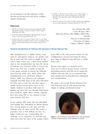2 citations,
May 2023 in “Biology” New mouse models of Pemphigus show severe symptoms and need better treatments.
 46 citations,
December 2010 in “The journal of investigative dermatology/Journal of investigative dermatology”
46 citations,
December 2010 in “The journal of investigative dermatology/Journal of investigative dermatology” Disrupting Acvr1b in mice causes severe hair loss and thicker skin.
1 citations,
January 2024 in “Microorganisms” Mice with a virus similar to COVID-19 had skin damage, but a special treatment helped repair it.
2 citations,
January 2016 in “Gynecological Endocrinology” A hidden autoimmune syndrome was found during a shock, showing thyroid, adrenal, and ovarian issues.
 21 citations,
January 2013 in “Clinical Endoscopy”
21 citations,
January 2013 in “Clinical Endoscopy” First Korean case of Cronkhite-Canada syndrome with colon cancer and serrated adenoma.
 1 citations,
May 2019 in “Journal of The European Academy of Dermatology and Venereology”
1 citations,
May 2019 in “Journal of The European Academy of Dermatology and Venereology” New method, hair distribution width (HDW), improves accuracy in diagnosing androgenetic alopecia (AGA).
 3 citations,
December 2022 in “Nutrients”
3 citations,
December 2022 in “Nutrients” Limonin from young citrus fruits may help with hair growth by affecting cell growth and hair cycle pathways.
 March 2019 in “Journal der Deutschen Dermatologischen Gesellschaft”
March 2019 in “Journal der Deutschen Dermatologischen Gesellschaft” Rothmund-Thomson syndrome type 2 can cause chronic, poorly healing wounds.
May 2024 in “International journal of molecular sciences” Platelet-derived products help regenerate tissue and are used in various skin and hair treatments.
 December 2023 in “Trials”
December 2023 in “Trials” The trial is testing if a helmet that uses light can prevent hair loss during chemotherapy.
 October 2023 in “Scientific Reports”
October 2023 in “Scientific Reports” Gene therapy helped rats with a specific type of rickets grow hair without severe inflammation.
1 citations,
January 2024 in “Journal of clinical medicine” Early recognition and treatment of tinea capitis are crucial to prevent severe scalp issues and prolonged therapy.
 January 2018 in “Stem cell biology and regenerative medicine”
January 2018 in “Stem cell biology and regenerative medicine” The conclusion is that the nuclear lamina and LINC complex in skin cells respond to mechanical signals, affecting gene expression and cell differentiation, which is important for skin health and can impact skin diseases.
 3 citations,
June 2023 in “Medicines”
3 citations,
June 2023 in “Medicines” Some antiseizure medications can cause reversible hair loss, with valproate, lamotrigine, and carbamazepine being the most common.
 July 2018 in “Journal of College of Medical Sciences-nepal”
July 2018 in “Journal of College of Medical Sciences-nepal” Women with certain types of hair loss may have low iron levels.
 2 citations,
February 2023 in “Vaccines”
2 citations,
February 2023 in “Vaccines” Some people experienced hair loss after COVID-19 vaccination, but it's very rare and vaccines' benefits are greater than this risk.
5 citations,
May 2022 in “Diagnostics” Certain genetic markers can indicate higher or lower risk for systemic lupus erythematosus.
 14 citations,
August 2022 in “Lupus Science & Medicine”
14 citations,
August 2022 in “Lupus Science & Medicine” SLE patients experience two patterns of non-inflammatory symptoms: intermittent and persistent.

Arabica coffee pulp extract may help prevent hair loss and promote hair growth.
3 citations,
August 2022 in “International Journal of Molecular Sciences” COVID-19 can cause hair loss, and treatments like PRP and stem cells might help.
 December 2024 in “Molecules”
December 2024 in “Molecules” Bovine milk-derived exosomes may improve skin, hair, gut, brain, and bone health.
 8 citations,
March 2020 in “Dermatologic Therapy”
8 citations,
March 2020 in “Dermatologic Therapy” The new hair loss treatment kit was safe and improved hair growth without any adverse effects.
 April 2019 in “Sohag Medical Journal”
April 2019 in “Sohag Medical Journal” Androgenetic alopecia is the most common cause of hair loss at Sohag University Hospital's hair clinic.

Certain natural products may help stimulate hair growth by affecting stem cell activity in the scalp.
 6 citations,
May 2013 in “Dermatologic Surgery”
6 citations,
May 2013 in “Dermatologic Surgery” FUE can be successfully done on African-American hair by using larger punch tools and careful techniques to reduce hair damage.
December 2023 in “Pharmaceutics” The new adhesive nanoparticles are effective for delivering Minoxidil to the scalp without skin irritation.
 February 2024 in “Medicina-lithuania”
February 2024 in “Medicina-lithuania” Obesity and bariatric surgery can cause hair thinning and temporary hair loss due to nutritional deficiencies and stress.
1 citations,
November 2023 in “Pathogens” Raccoon dogs in Schleswig-Holstein, Germany, were found with sarcoptic mange, showing severe skin issues and potential for spreading the disease.
 February 2025 in “Biomolecules”
February 2025 in “Biomolecules” Melatonin can help or hinder hair growth depending on the dose.
 January 2013 in “Revista brasileira de medicina”
January 2013 in “Revista brasileira de medicina” The study concluded that hair loss treatments should be tailored to the specific type of alopecia and individual patient needs.




















